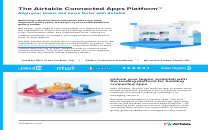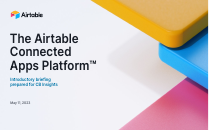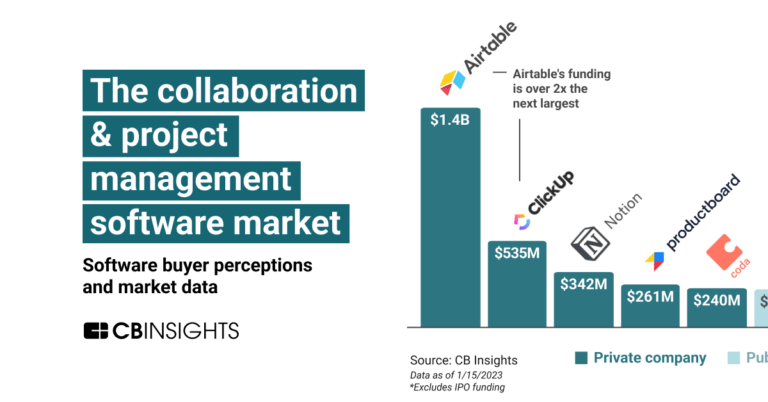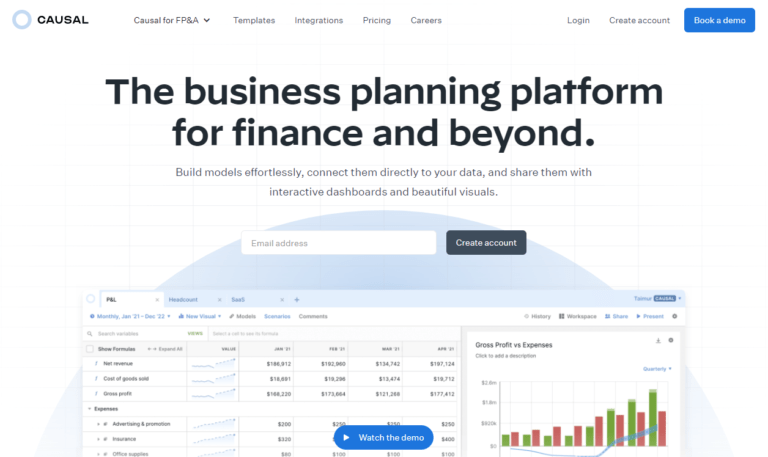
Airtable
Founded Year
2013Stage
Series F | AliveTotal Raised
$1.353BValuation
$0000Last Raised
$735M | 3 yrs agoRevenue
$0000About Airtable
Airtable specializes in providing a no-code platform for app-building within various business sectors. Its main offerings include enabling teams to create custom business applications without the need for coding, automating workflows, and integrating artificial intelligence to enhance end-to-end processes. Airtable's platform is designed to connect data from various applications and tools, creating a centralized source of truth for organizations. It was founded in 2013 and is based in San Francisco, California.
Loading...
Airtable's Product Videos


ESPs containing Airtable
The ESP matrix leverages data and analyst insight to identify and rank leading companies in a given technology landscape.
The product management software market provides software solutions for managing product development and lifecycle processes. These solutions typically include features such as idea generation, project planning, resource allocation, collaboration tools, and analytics. The market is driven by increasing demand from companies looking to streamline their product development processes and improve time-…
Airtable named as Leader among 11 other companies, including Pendo, Productboard, and Productsup.
Airtable's Products & Differentiators
The Airtable Connected Apps Platform™
Achieving critical business outcomes takes org-wide alignment: every team, working in sync to make ambitious goals a reality. But today, silos make it near-impossible to collaborate across the organization. Teams are stuck battling multiple sources of truth, inaccessible data, and fragmented tools: relying on endless meetings, messages, and rigid project management tools to stay aligned. Airtable breaks down these silos, connecting teams across the organization and enabling them to work better, together. The Airtable Connected Apps Platform™ empowers teams to build custom apps on top of data, purpose-built to support their unique workflows. The result: teams that can move together, move faster, and deliver better business results.
Loading...
Research containing Airtable
Get data-driven expert analysis from the CB Insights Intelligence Unit.
CB Insights Intelligence Analysts have mentioned Airtable in 2 CB Insights research briefs, most recently on Jan 30, 2023.


Mar 29, 2022
Airtable competitor Causal raises $20M from CoatueExpert Collections containing Airtable
Expert Collections are analyst-curated lists that highlight the companies you need to know in the most important technology spaces.
Airtable is included in 5 Expert Collections, including Construction Tech.
Construction Tech
1,452 items
Companies in the construction tech space, including additive manufacturing, construction management software, reality capture, autonomous heavy equipment, prefabricated buildings, and more
Unicorns- Billion Dollar Startups
1,257 items
Tech IPO Pipeline
825 items
Work From Home Startups
91 items
Track startups and capture company information and workflow.
Job Site Tech
913 items
Companies in the job site tech space, including technologies to improve industries such as construction, mining, process engineering, forestry, and fieldwork
Latest Airtable News
Jan 19, 2025
Geeky Gadgets 7:02 am Automation is reshaping how workflows are managed, and combining the capabilities of ChatGPT with the flexibility of Make.com offers a powerful solution for simplifying tasks. By integrating ChatGPT with tools such as Airtable , Google Sheets, and Salesforce, you can automate repetitive processes, reduce manual effort, and significantly enhance productivity. This guide explores how to build efficient automation systems by focusing on webhooks, database interactions, and dynamic filters, allowing you to create seamless workflows tailored to your needs. In this guide by AI Foundations explore how to integrate ChatGPT with Make to create custom automations that fit your unique needs. Whether it’s syncing data between Airtable and Google Sheets , generating insights from customer feedback, or automating repetitive CRM tasks, this combination opens up endless possibilities. You don’t need to be a tech wizard to make it happen—just a willingness to experiment and a little guidance (which we’ve got covered). Automations Using ChatGPT and Make TL;DR Key Takeaways : Integrating ChatGPT with Make.com enables seamless automation by connecting tools like Airtable, Google Sheets, and Salesforce, reducing manual work and boosting productivity. Webhooks and dynamic filters in Make.com allow for precise data handling, triggering actions based on specific events and retrieving relevant records for processing. Customizing ChatGPT with structured input/output formats and prompt templates ensures tailored responses that align with specific workflow requirements. Practical use cases include automating emails, managing CRM workflows, syncing calendars, and processing data in spreadsheets, enhancing efficiency across various tasks. Regular testing and engagement with AI-focused communities help refine automation systems, troubleshoot issues, and stay updated on best practices and innovations. Establishing a connection between ChatGPT and Make.com is the first step toward automating your workflows. This integration allows ChatGPT to interact with external applications, facilitating real-time data exchange through webhooks. Webhooks serve as triggers that activate automation when specific events occur, making sure smooth and timely data flow between systems. For example: – A webhook can trigger when a new record is added to Airtable, initiating a predefined workflow. – Similarly, it can activate when a task is updated in Salesforce, making sure the latest information is processed. By connecting ChatGPT with Make.com, you create a foundation for efficient automation, allowing your tools to work together seamlessly. Customizing ChatGPT Automations To maximize the effectiveness of automation, it is essential to customize ChatGPT for your specific use case. This involves defining structured input and output formats to ensure consistent and accurate data exchange. For instance: – ChatGPT can be configured to analyze customer feedback stored in Airtable and return actionable insights in a structured JSON format. – Prompt templates play a critical role here, guiding ChatGPT to process data according to your unique requirements. By tailoring ChatGPT’s responses, you can align its output with the specific needs of your workflows, making sure that the automation delivers meaningful and relevant results. Automate Anything Setting Up Automations in Make.com Make.com serves as the backbone of your automation system, allowing you to design workflows that connect multiple tools and applications. Here’s how to build effective automations using Make.com: Webhooks: Configure webhooks to trigger actions based on specific events, such as new database entries, form submissions, or calendar updates. Modules: Use modules to retrieve data from sources like Airtable, process it with ChatGPT, and send the results back to the database or another application. Data Formatting: Use tools such as JSON formatting and array aggregators to structure outputs for compatibility with other systems. For example, you can create a workflow where ChatGPT extracts raw data from Airtable, refines it into a detailed business plan, and updates the database with the final output. This approach not only saves time but also ensures consistency and accuracy across your processes. Enhancing Database Interactions with Dynamic Filters Dynamic filters in Make.com allow you to retrieve specific records from databases like Airtable based on predefined criteria such as dates, tags, or categories. These filters ensure that only the most relevant data is processed, improving the efficiency and precision of your workflows. For example: – You can store marketing ideas in Airtable and use ChatGPT to generate tailored social media content from selected records. – Filters can be applied to retrieve only the most recent or relevant ideas, making sure that your automation focuses on high-priority tasks. This method enables you to create workflows that are both adaptable and highly targeted, allowing you to manage data more effectively. Testing and Refining Your Automation Testing is a crucial step in building reliable automation systems. It ensures that your workflows function as intended and helps identify areas for improvement. Follow these steps to refine your automation: Run test scenarios to verify that webhooks trigger correctly and data flows seamlessly between applications. Analyze the results to detect any inefficiencies or errors in the workflow. Iterate by refining your schema, prompt templates, and filters until the system operates smoothly and consistently. Regular testing not only resolves potential issues but also ensures the long-term reliability and scalability of your automation system. Practical Applications and Use Cases The combination of ChatGPT and Make.com offers a wide range of practical applications across various industries. Here are some examples of how you can use this integration: Email Automation: Generate and send personalized emails using data from your CRM, making sure timely and relevant communication. Calendar Integration: Automate scheduling by syncing ChatGPT with your calendar to manage appointments, reminders, and event updates. CRM Workflows: Streamline customer relationship management by automating data updates, lead assignments, and task creation in tools like Salesforce. Spreadsheet Management: Use Google Sheets to track, analyze, and update data processed by ChatGPT, reducing manual input and errors. For instance, you can automate lead management in Salesforce by having ChatGPT analyze incoming leads and assign them to the appropriate sales representatives. This ensures timely follow-ups and reduces the workload on your team. Engaging with an AI-Focused Community To fully unlock the potential of ChatGPT and Make.com, consider engaging with an AI-focused community. These communities provide valuable resources and insights, including: Prompt templates designed to optimize ChatGPT’s performance for specific use cases. Troubleshooting tips to resolve common issues and improve workflow efficiency. Expert advice and best practices for building advanced and scalable automation systems. Participating in such communities helps you stay updated on the latest developments, discover innovative use cases, and refine your automation strategies for maximum impact.
Airtable Frequently Asked Questions (FAQ)
When was Airtable founded?
Airtable was founded in 2013.
Where is Airtable's headquarters?
Airtable's headquarters is located at 799 Market Street, San Francisco.
What is Airtable's latest funding round?
Airtable's latest funding round is Series F.
How much did Airtable raise?
Airtable raised a total of $1.353B.
Who are the investors of Airtable?
Investors of Airtable include Caffeinated Capital, Thrive Capital, Coatue, Benchmark, D1 Capital Partners and 41 more.
Who are Airtable's competitors?
Competitors of Airtable include Coda, Causal, SmartSheet, Rows, Nucla and 7 more.
What products does Airtable offer?
Airtable's products include The Airtable Connected Apps Platform™.
Loading...
Compare Airtable to Competitors

ClickUp is a project management and productivity platform designed to facilitate team collaboration and efficiency across various industries. The company offers tools including task management, goal tracking, document sharing, and AI-powered features to manage workflows and productivity. ClickUp primarily serves sectors that require project management solutions, such as marketing, product development, engineering, and agencies. It was founded in 2016 and is based in San Diego, California.

Wrike is a work management platform that focuses on project management and workflow automation across teams and departments. The company provides tools for task tracking, dashboards, and security to support analytics and approval workflows. Wrike's platform is intended to improve processes for marketing, creative, professional services, IT, and engineering teams, allowing them to manage resources and automate tasks. It was founded in 2006 and is based in San Diego, California.

Notion provides a workspace platform for documentation and project management across teams and organizations. The platform includes tools such as wikis, docs, project management, and calendar features, along with an AI assistant. Notion serves teams and individuals across various sectors. It was founded in 2016 and is based in San Francisco, California.

Hive is a project management software company that provides a platform for teams to manage their projects, tasks, and collaboration efforts across various sectors. The company's main offerings include tools for project planning, task management, time tracking, resource allocation, and team collaboration. Hive serves industries such as marketing, business operations, education, design, and enterprise sectors, offering solutions to meet their project management needs. It was founded in 2016 and is based in New York, New York.
Bear is a note-taking and writing application that focuses on Markdown-based text creation and organization across various devices. The app provides tools for capturing and organizing notes with features such as tagging, exporting to multiple formats, and note encryption. Bear is designed for individuals who need a solution for personal organization and note management. It is based in Parma, Italy.

Basecamp is a project management software company that specializes in online collaboration and task coordination. Its platform offers a suite of tools designed to help small teams track tasks, manage projects, and facilitate communication, all within a single, user-friendly interface. Basecamp's services are utilized by a diverse range of sectors including marketers, client services firms, software developers, and educational institutions. Basecamp was formerly known as 37Signals. It was founded in 1999 and is based in Chicago, Illinois.
Loading...